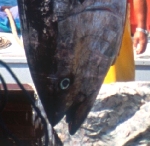It is widely recognized that fish populations have dropped drastically over the past century, but a new study in Nature Communications shows the decline may be worse than expected. Research from the University of York and the Marine Conservation Society has discovered that it was 17 times easier in the UK to catch fish in 1889—when ships were powered by sail—than it is today using high-powered motor boats with technological advances.
“We were astonished to discover that we landed over four times more fish into England and Wales in 1889 than we do today,” Ruth Thurstan, lead author of the study from the University of York’s Environment Department, said. “For all its technological sophistication and raw power, today’s trawl fishing fleet has far less success than its sail-powered equivalent of the late 19th century because of the sharp declines in fish abundance.”
Employing government data, the study compared the amount of fish caught versus the number and size of the boats used during the past 118 years (from 1889-2007). Looking specifically at bottom dwelling fish, such as cod, haddock, and plaice, the study found that the availability of these species has fallen by 94 percent since 1889.
For example, a ship powered by wind in the 19th Century on average brought in double the amount of fish over today’s fishing vessels with over 100 years of technological advances. These technological gaps were factored into the study by measuring fish landings against a fleet’s ‘fishing power’, which reveals that it was 17 times easier to catch fish in 1889 than it was in 2007.
In the UK fish catches peaked in 1938—a combination of fish availability and increasingly sophisticated methods of catching vast amounts of fish—when vessels caught 5.8 times more fish than today.
According to researchers the study paints a much longer picture of fish decline around the UK than officials usually recognize.
“European fish stock assessments, and the management targets based on them, go back only 20 to 40 years. These results should supply an important corrective to the short-termism inherent in fisheries management today,” said Professor Callum Roberts, from the University of York’s Environment Department, adding that “this research makes clear that the state of UK bottom fisheries—and by implication European fisheries, since the fishing grounds are shared—is far worse than even the most pessimistic of assessments currently in circulation.”
Related articles
World failing on every environmental issue: an op-ed for Earth Day

(04/22/2010) The biodiversity crisis, the climate crisis, the deforestation crisis: we are living in an age when environmental issues have moved from regional problems to global ones. A generation or two before ours and one might speak of saving the beauty of Northern California; conserving a single species—say the white rhino—from extinction; or preserving an ecological region like the Amazon. That was a different age. Today we speak of preserving world biodiversity, of saving the ‘lungs of the planet’, of mitigating global climate change. No longer are humans over-reaching in just one region, but we are overreaching the whole planet, stretching ecological systems to a breaking point. While we are aware of the issues that threaten the well-being of life on this planet, including our own, how are we progressing on solutions?
History repeats itself: the path to extinction is still paved with greed and waste

(04/05/2010) As a child I read about the near-extinction of the American bison. Once the dominant species on America’s Great Plains, I remember books illustrating how train-travelers would set their guns on open windows and shoot down bison by the hundreds as the locomotive sped through what was left of the wild west. The American bison plunged from an estimated 30 million to a few hundred at the opening of the 20th century. When I read about the bison’s demise I remember thinking, with the characteristic superiority of a child, how such a thing could never happen today, that society has, in a word, ‘progressed’. Grown-up now, the world has made me wiser: last month the international organization CITES (Convention on International Trade in Endangered Species) struck down a ban on the Critically Endangered Atlantic bluefin tuna. The story of the Atlantic bluefin tuna is a long and mostly irrational one—that is if one looks at the Atlantic bluefin from a scientific, ecologic, moral, or common-sense perspective.
Critically Endangered bluefin tuna receives no reprieve from CITES
(03/18/2010) A proposal to totally ban the trade in the Critically Endangered Atlantic bluefin tuna failed at the Convention on International Trade in Endangered Species (CITES), surprising many who saw positive signs leading up to the meeting of a successful ban.







